Key takeaways
- Successful campaign teams rely on a mix of experienced and passionate members, tailoring messages to resonate with local electorates.
- Clear roles, effective communication, and adaptability are critical for maintaining team momentum in the fast-paced campaign environment.
- Building trust and morale among team members enhances overall performance and fosters a supportive atmosphere, even during challenging times.
- Flexibility in leadership and an understanding of individual strengths contribute significantly to a cohesive and motivated campaign team.
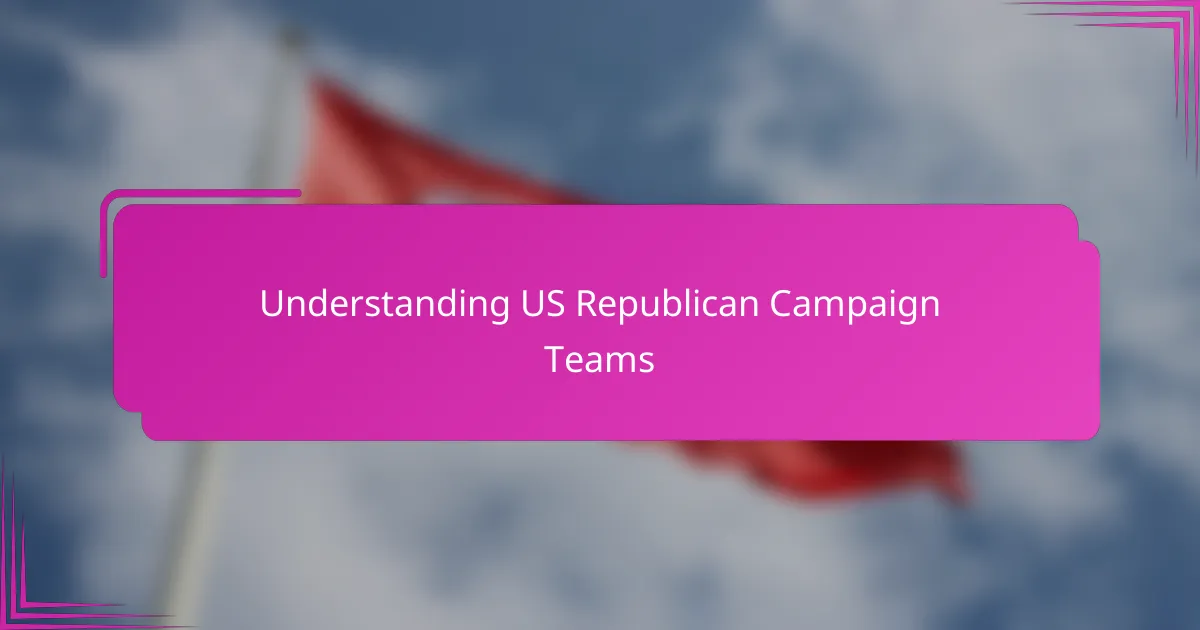
Understanding US Republican Campaign Teams
When I first joined a US Republican campaign team, I quickly realized how structured and strategic these groups are. Each member has a clear role, from communications to voter outreach, and their coordination is crucial. It made me wonder, how does such a complex operation stay so tightly aligned under pressure?
One thing that stood out to me was the depth of experience many team members brought. These were people who had spent years working on GOP campaigns or in conservative political circles. Their insights on messaging and grassroots mobilization were invaluable, and I learned that successful campaigns really depend on this blend of seasoned expertise and fresh energy.
I also noticed how much emphasis was placed on understanding the local electorate. It’s not just about national talking points; tailoring the message to community values is key. Have you ever thought about how much listening and adapting is required behind the scenes? That’s the kind of hands-on, responsive teamwork that drives a Republican campaign forward in my experience.
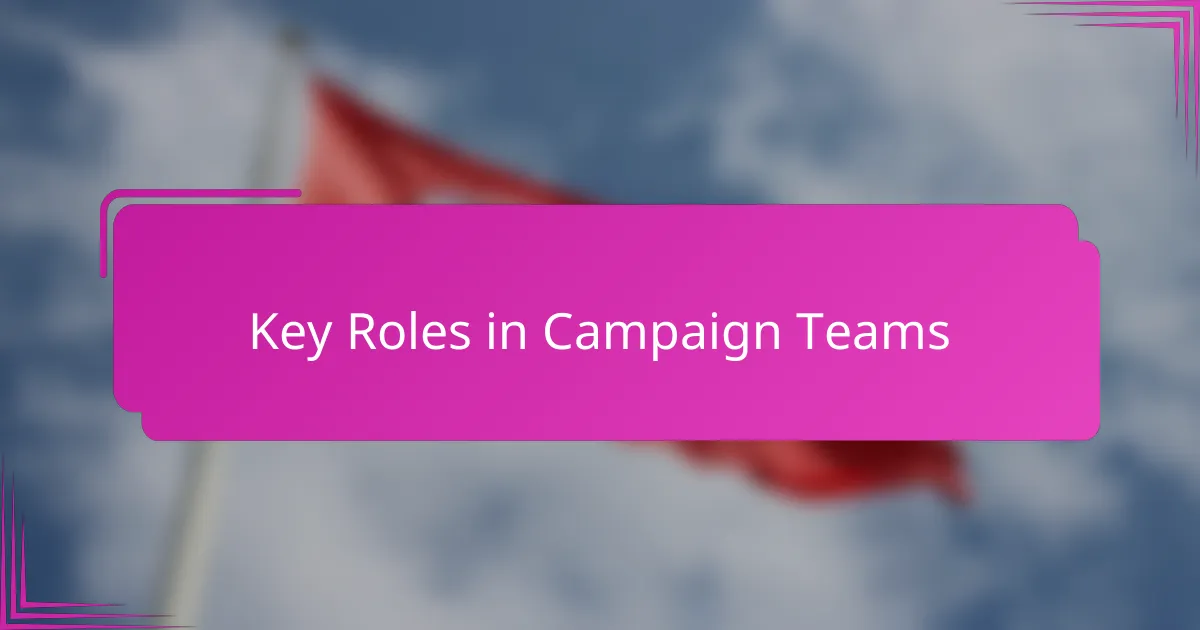
Key Roles in Campaign Teams
One of the first things I grasped was how critical specific roles are on a campaign team. The campaign manager, for instance, acts like the team’s quarterback—calling plays, managing resources, and keeping everyone on the same page. Watching a strong manager onboard was like seeing the whole operation hum smoothly, even in the chaos of tight deadlines.
Then there’s the communications director. I remember once during a heated debate, this person’s quick thinking on message adjustments saved us from potential backlash. They craft the narrative that reaches voters, which is no small task when every word is scrutinized. It made me realize how vital clear and consistent messaging is for maintaining voter trust.
Finally, grassroots coordinators impressed me most. Their job involves connecting directly with volunteers and voters, often in ways that aren’t flashy but deeply impactful. I often asked myself, how do they keep motivation high during long, exhausting days? The answer came through their passion for the cause and the personal relationships they build—something you can’t underestimate in a grassroots-driven campaign.
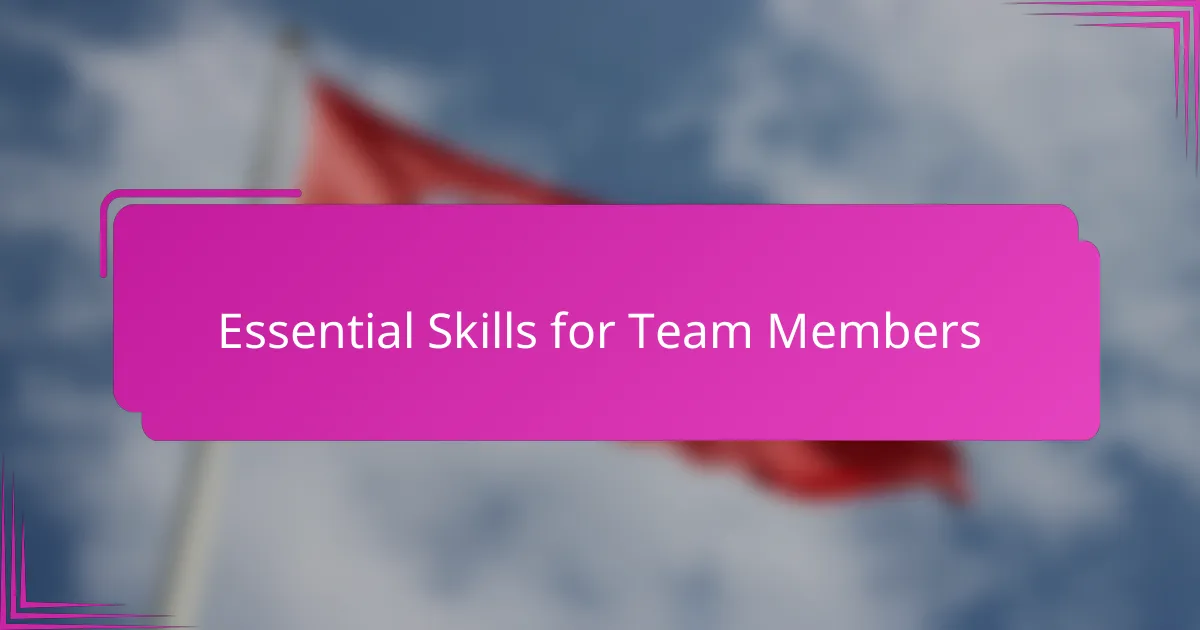
Essential Skills for Team Members
What really stood out to me was how essential flexibility is for every team member. Campaigns are unpredictable; plans change on a dime, and being able to adapt without losing focus can make or break the team’s momentum. I remember a day when a sudden controversy erupted, and the rapid adjustments from each member kept us afloat—proof that resilience isn’t just a buzzword but a practical skill.
Communication skills are another cornerstone. I’ve seen firsthand how a simple misstep in conveying information can cause delays or confusion. When team members are clear, concise, and proactive in sharing updates, the whole campaign benefits. It made me appreciate the value of daily check-ins and open channels, which often kept us connected despite long hours and high stress.
Lastly, I can’t stress enough the importance of commitment and passion. It’s more than just doing a job; it’s believing in the candidate and the cause. During late nights and tough setbacks, those who genuinely cared kept the energy alive. I often found myself inspired by their drive, reminding me that skills alone don’t win campaigns—heart does.
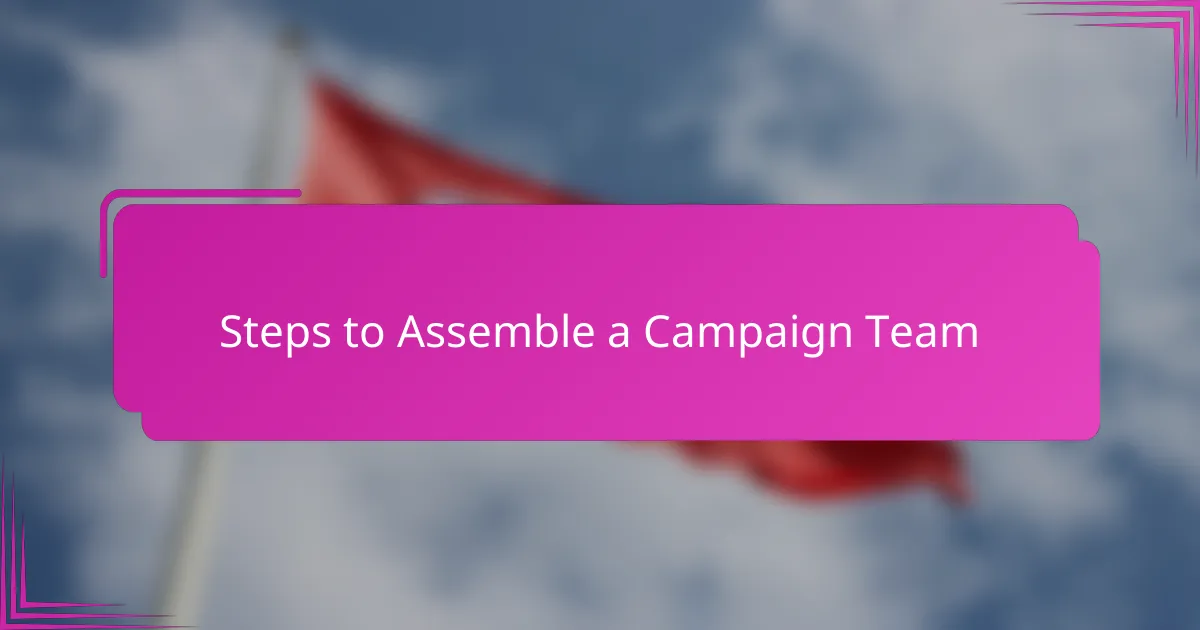
Steps to Assemble a Campaign Team
The first step in building a campaign team, from my experience, is identifying the core positions that will drive the operation forward—campaign manager, communications director, and grassroots coordinator top the list. I found that starting with these key roles creates a solid spine for the team, ensuring each crucial function is covered. It made me think, how could you expect a campaign to run smoothly without clearly defined leadership and outreach roles?
Next, I focused on recruiting individuals who not only had the right skills but also shared a genuine commitment to the campaign’s mission. During one early meeting, I watched how a candidate’s passion energized a volunteer who initially seemed hesitant, reminding me that enthusiasm often trumps experience in the early stages. Have you ever noticed how contagious that kind of excitement can be, especially when building momentum from scratch?
Finally, I learned the importance of setting clear expectations and fostering open communication right away. When I saw how quickly misunderstandings could cause delays, I insisted on regular check-ins and transparent updates. This upfront coordination felt like laying down the tracks before a train starts rolling—without it, even the best team can quickly derail.

Challenges in Building a Campaign Team
One of the biggest challenges I faced was finding people who not only had the right skills but also genuinely believed in the candidate’s vision. I remember feeling frustrated when someone with impressive credentials didn’t quite share the same passion—it made me realize that technical ability alone isn’t enough to keep a team motivated through long, exhausting days. Have you ever tried rallying a group where the energy just isn’t there? It’s tough.
Another hurdle was managing differing personalities and work styles. Campaigns are high-pressure environments, and tensions can flare quickly. I witnessed moments when clashes threatened to disrupt our progress, and it took deliberate effort to mediate and refocus everyone on the common goal. In those times, I learned that emotional intelligence is just as important as strategic thinking on a campaign team.
Finally, the unpredictable nature of political campaigns added its own layer of challenge. Unexpected events forced sudden shifts in plans, and coordinating rapid responses meant the team had to stay flexible yet aligned. I often asked myself how we could keep communication seamless amid the chaos—and that question pushed me to prioritize clear, constant updates, which ultimately made all the difference.
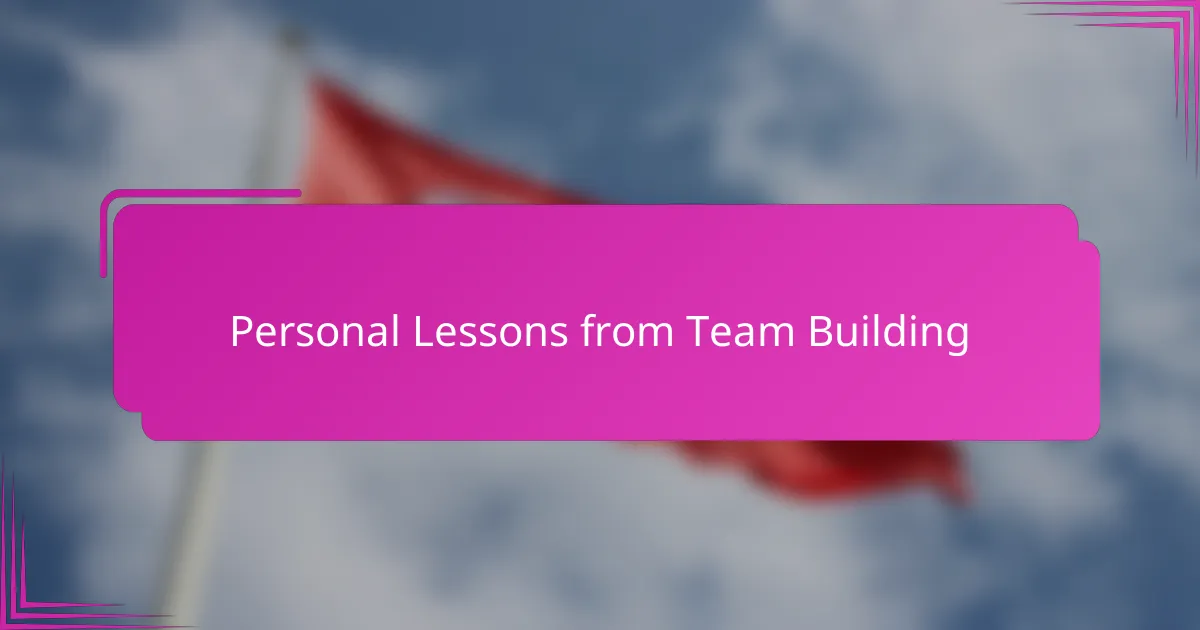
Personal Lessons from Team Building
Building a campaign team taught me that trust is the foundation you can’t shortcut. Early on, I hesitated to delegate key tasks because I worried about mistakes, but that only slowed us down. Once I learned to trust my teammates’ judgment, the whole operation became more dynamic and efficient—have you ever felt that relief when a team member takes ownership and surprises you in the best way?
I also discovered that flexibility isn’t just about handling unexpected events, but about embracing different working styles and strengths. Some team members thrived under pressure, while others needed encouragement and space to shine. Recognizing these differences helped me adapt my leadership approach and created a stronger, more cohesive team. Isn’t it interesting how understanding people can make or break a campaign more than any strategic plan?
Lastly, I came to realize that building morale is as crucial as building structure. There were days when fatigue and frustration crept in, and simple gestures—a word of thanks, a shared laugh—made a huge difference. Those moments reminded me that campaigns aren’t just political machines; they’re human endeavors fueled by passion and connection. How often do we forget that behind every campaign sign is a person giving their all?